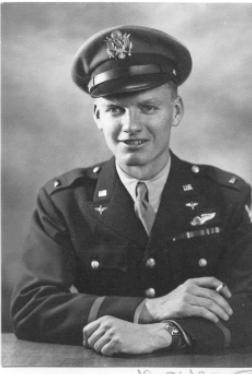|

 5. Around the lake 5. Around the lake
The next morning I was placed in a wagon and a small load of hay was thrown over me. A horse pulled the wagon out of the farmyard and we jostled over roads and through a field. When the wagon stopped and the hay was pulled back, I saw that we were on the edge of a marsh (1) which was covered with tall grass.
The farmer and I found a dry spot and he gave me some bread and cheese and a bottle of wine which he had brought along. He had tears in his eyes as he indicated that he would like to help more, but the Germans would kill his family if I was found on his farm. He said that friends would come for me that night.
Time passed slowly as I sat in the grass with nothing to read and little to do. I examined my escape kit again and again, surveying the possible routes of escape on the map. There were only two possibilities: make my way to the coast and hope to get passage on a neutral ship or walk south and cross the Pyrenees into Spain.
I wasn't too far from the bay, but the coastal areas would be heavily patrolled and I might be unable to find a neutral ship whose crew would help me. That course seemed to offer too many obstacles, especially since I was clothed in a cotton khaki uniform and flying suit. The Pyrenees were approximately two hundred and fifty miles away as the crow flies. Add fifty miles for the road distance and the total would be three hundred miles. That would take at least fifteen nights of walking since the nights were short.
While I was pondering these thoughts, I was startled by a distant burst of machine gun fire. Across the flat valley I could make out a number of barrack type buildings. Apparently, it was a German army camp.
After the sun set, I was visited by two young men (2). They brought food, a bottle of wine, and a bottle of cognac. They had been trying to contact the organization but had not been successful. I should not despair, though, because they would surely be successful tomorrow.
The night was warm and sleeping on a bed of marsh grass wasn't too uncomfortable. I arose with the sun the next day and began another day of doing nothing.
About noon, I had another visitor. He was a priest who spoke excellent English. We talked at length about England, the United States and the war. Several of the men who had befriended me were members of his church and had sought his help. He did not have contact with the organization and knew of no way to make contact. Further help by the friendly Frenchmen would only result in endangering their lives and their families' lives. I had to agree, that without organized help, the risk to them was not worth the doubtful outcome. The priest gave me his blessing and departed. I wondered if there was another place on earth where men would have risked death, if caught, by helping me as much as they had.
My fate was now in my own hands. I weighed the problems that confronted me. I would have to walk at least three hundred miles and then cross the border. My back still caused me constant pain and it might become worse. I would have to travel at night and avoid the towns and villages. Guards and patrols would have to be avoided. I would have to forage for food, but it was mid-summer and fruit and vegetables should be available. I decided to spend one more night in the marsh, plan my route the next day and start traveling the following night.
As night fell, clouds blanketed the sky and a cool rain began falling. My clothes became soaked and sleep was sporadic. The bottle of cognac made the wet night more bearable. Toward morning the rain stopped and I slept.
With the first light of dawn, I awoke suddenly at the sound of voices. It was the two young men who had visited me the first night in the marsh. They feared that I might have left and started my journey. They were very excited. My troubles were over. This evening two men would arrive with three bicycles and I would be taken to the city.
That evening two men in their middle thirties arrived carrying a bundle of clothing. I discarded my flying clothes and uniform, after removing the wings and silver lieutenant bars, and dressed in civilian clothes. My new friends showed me how to wear the beret.
 (1) marsh around Grand Lieu lake (lac de grand lieu)
(1) marsh around Grand Lieu lake (lac de grand lieu)
(2) Jean Chataigner and Bernard Papin
[Top] [Next]
|
|

